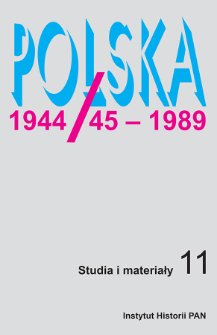- Wyszukaj w całym Repozytorium
- Piśmiennictwo i mapy
- Archeologia
- Baza Młynów
- Nauki przyrodnicze
Wyszukiwanie zaawansowane
Wyszukiwanie zaawansowane
Wyszukiwanie zaawansowane
Wyszukiwanie zaawansowane
Wyszukiwanie zaawansowane

Obiekt
Tytuł: Pół stulecia od wydania pierwszego tomu „Kroniki” Ludwika Landaua : uwagi wydawców
Twórca:
Landau, Zbigniew (1931–2018) ; Tomaszewski, Jerzy (1930–2014)
Data wydania/powstania:
Typ zasobu:
Inny tytuł:
Polska 1944/45-1989 : studia i materiały 11 (2013)
Współtwórca:
Instytut Historii Polskiej Akademii Nauk
Wydawca:
Miejsce wydania:
Opis:
Typ obiektu:
Abstrakt:
When, half a century ago, Tadeusz Szturm de Sztrem from the Polish Scientific Publishers PWN approached Zbigniew Landau and Jerzy Tomaszewski with a proposal to edit for publication ‘The Chronicle of the Years of War and Occupation’ by Ludwik Landau, they were aware both of historical significance of that work and of difficulties they would face. Today, they are still convinced not only that it was unprecedented in Polish and European memoirist and chronicle literature but also that it is the most important chronicle document written in Polish, and probably in other languages, pertaining to World War II. The editors do not disparage chronicles by other authors that were written in Poland and survived all ravages of time. In their opinion, however, Ludwik Landau’s ‘Chronicle’ is distinguished by its particular features, since the author departed from the method of describing personal experiences. His ‘Chronicle’ attempts to present the war not through the prism of the author’s personal participation in events but in an impersonal, objective manner, trying to create a general picture, resulting from the experiences of the whole nation rather than an individual.The author of the ‘Chronicle’, Ludwik Landau, was a scholar, sociologist and economist, who had learned how to critically confront various sources, starting from the German press, to underground press (which had access to the Radio news and information from the network of Polish underground intelligence); he also gathered news from individuals through his personal contacts with Warsaw inhabitants, by various ways. An important source was German legislations, critically confronted with the articles and information from the German press. All that material was analysed by the author, and his commentaries and conclusions are of great importance for contemporary historians.Of special value are information from his own observations and personal contacts. On this basis he was able to conclude about the moods of Warsaw inhabitants, occasionally also about the relations in the countryside. A contemporary historian can confront this abundant material with the knowledge from documentation rendered available after the war, sometimes many years later, gained from other sources.
Czasopismo/Seria/cykl:
Polska 1944/45-1989 : studia i materiały
Tom:
Strona pocz.:
Strona końc.:
Szczegółowy typ zasobu:
Format:
Identyfikator zasobu:
oai:rcin.org.pl:59727 ; 2450-8357
Źródło:
IH PAN, sygn. B.155/11 Podr. ; IH PAN, sygn. B.156/11 ; kliknij tutaj, żeby przejść
Język:
Język streszczenia:
Prawa:
Prawa zastrzeżone - dostęp ograniczony
Zasady wykorzystania:
Digitalizacja:
Instytut Historii Polskiej Akademii Nauk
Lokalizacja oryginału:
Biblioteka Instytutu Historii PAN
Dostęp:
Kolekcje, do których przypisany jest obiekt:
- Repozytorium Cyfrowe Instytutów Naukowych > Kolekcje Partnerów > Instytut Historii PAN > Czasopisma
- Repozytorium Cyfrowe Instytutów Naukowych > Kolekcje Partnerów > Instytut Historii PAN > Wydawnictwa Instytutu
- Repozytorium Cyfrowe Instytutów Naukowych > Kolekcje Partnerów > Instytut Historii PAN > Wydawnictwa Instytutu > Czasopisma
- Repozytorium Cyfrowe Instytutów Naukowych > Kolekcje Partnerów > Instytut Historii PAN > Wydawnictwa Instytutu > Czasopisma > Polska 1944/45-1989
- Repozytorium Cyfrowe Instytutów Naukowych > Piśmiennictwo > Czasopisma/Artykuły
Data ostatniej modyfikacji:
2 paź 2020
Data dodania obiektu:
21 wrz 2016
Liczba pobrań / odtworzeń:
46
Wszystkie dostępne wersje tego obiektu:
https://rcin.org.pl./publication/78836
Wyświetl opis w formacie RDF:
Wyświetl opis w formacie RDFa:
Wyświetl opis w formacie OAI-PMH:
Obiekty Podobne
Tomaszewski, Jerzy (1930–2014) Landau, Zbigniew (1931–2018)
Landau, Zbigniew (1931–2018)
Gerlach, Jan (1893–1983) Landau, Zbigniew (1931–2018) Tomaszewski, Jerzy (1930–2014)
Zajączkowski, Andrzej (1922–1994) Pałucki, Władysław (1905–1989) Kowalska-Lewicka, Anna Landau, Zbigniew (1931–2018) Tomaszewski, Jerzy (1930–2014) Jabłoński, Henryk (1909–2003)
Landau, Zbigniew (1931–2018)
Landau, Zbigniew (1931–2018)
Landau, Zbigniew (1931–2018)

 INSTYTUT ARCHEOLOGII I ETNOLOGII POLSKIEJ AKADEMII NAUK
INSTYTUT ARCHEOLOGII I ETNOLOGII POLSKIEJ AKADEMII NAUK
 INSTYTUT BADAŃ LITERACKICH POLSKIEJ AKADEMII NAUK
INSTYTUT BADAŃ LITERACKICH POLSKIEJ AKADEMII NAUK
 INSTYTUT BADAWCZY LEŚNICTWA
INSTYTUT BADAWCZY LEŚNICTWA
 INSTYTUT BIOLOGII DOŚWIADCZALNEJ IM. MARCELEGO NENCKIEGO POLSKIEJ AKADEMII NAUK
INSTYTUT BIOLOGII DOŚWIADCZALNEJ IM. MARCELEGO NENCKIEGO POLSKIEJ AKADEMII NAUK
 INSTYTUT BIOLOGII SSAKÓW POLSKIEJ AKADEMII NAUK
INSTYTUT BIOLOGII SSAKÓW POLSKIEJ AKADEMII NAUK
 INSTYTUT CHEMII FIZYCZNEJ PAN
INSTYTUT CHEMII FIZYCZNEJ PAN
 INSTYTUT CHEMII ORGANICZNEJ PAN
INSTYTUT CHEMII ORGANICZNEJ PAN
 INSTYTUT FILOZOFII I SOCJOLOGII PAN
INSTYTUT FILOZOFII I SOCJOLOGII PAN
 INSTYTUT GEOGRAFII I PRZESTRZENNEGO ZAGOSPODAROWANIA PAN
INSTYTUT GEOGRAFII I PRZESTRZENNEGO ZAGOSPODAROWANIA PAN
 INSTYTUT HISTORII im. TADEUSZA MANTEUFFLA POLSKIEJ AKADEMII NAUK
INSTYTUT HISTORII im. TADEUSZA MANTEUFFLA POLSKIEJ AKADEMII NAUK
 INSTYTUT JĘZYKA POLSKIEGO POLSKIEJ AKADEMII NAUK
INSTYTUT JĘZYKA POLSKIEGO POLSKIEJ AKADEMII NAUK
 INSTYTUT MATEMATYCZNY PAN
INSTYTUT MATEMATYCZNY PAN
 INSTYTUT MEDYCYNY DOŚWIADCZALNEJ I KLINICZNEJ IM.MIROSŁAWA MOSSAKOWSKIEGO POLSKIEJ AKADEMII NAUK
INSTYTUT MEDYCYNY DOŚWIADCZALNEJ I KLINICZNEJ IM.MIROSŁAWA MOSSAKOWSKIEGO POLSKIEJ AKADEMII NAUK
 INSTYTUT PODSTAWOWYCH PROBLEMÓW TECHNIKI PAN
INSTYTUT PODSTAWOWYCH PROBLEMÓW TECHNIKI PAN
 INSTYTUT SLAWISTYKI PAN
INSTYTUT SLAWISTYKI PAN
 SIEĆ BADAWCZA ŁUKASIEWICZ - INSTYTUT TECHNOLOGII MATERIAŁÓW ELEKTRONICZNYCH
SIEĆ BADAWCZA ŁUKASIEWICZ - INSTYTUT TECHNOLOGII MATERIAŁÓW ELEKTRONICZNYCH
 MUZEUM I INSTYTUT ZOOLOGII POLSKIEJ AKADEMII NAUK
MUZEUM I INSTYTUT ZOOLOGII POLSKIEJ AKADEMII NAUK
 INSTYTUT BADAŃ SYSTEMOWYCH PAN
INSTYTUT BADAŃ SYSTEMOWYCH PAN
 INSTYTUT BOTANIKI IM. WŁADYSŁAWA SZAFERA POLSKIEJ AKADEMII NAUK
INSTYTUT BOTANIKI IM. WŁADYSŁAWA SZAFERA POLSKIEJ AKADEMII NAUK


































